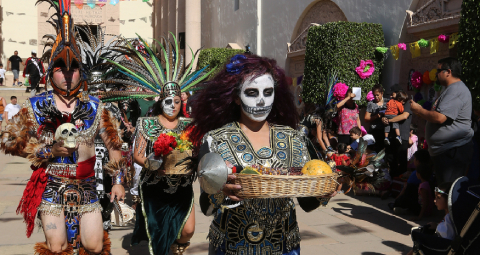BY Ryan McDougall | November 15 | ![]() 0 COMMENTS
0 COMMENTS ![]() print
print

November is the right time for soul-searching
For Catholics around the world, the beginning of November marks two important related feast days, All Saints’ Day, on November 1 and All Souls’ Day, known in Mexico as the Day of the Dead, on November 2, Colette Cooper writes.
Both festivals, at least in most of Europe, are overshadowed today by Halloween (All Hallows’ Eve), which has become the focus of popular festivities, and an ever-present fascination with the macabre.
However, it is perhaps more important to remember the significance of All Souls’, and to mark the day, though in a less flamboyant manner than Mexicans currently do, by reflecting on our own mortality.
Holy Souls
While we ought to remember all the Holy Souls in this month of November, it’s also important for each of us as Catholics to start thinking more about our own death.
As difficult as it may be to think about this, at some point in our lives each of us will pass from one life to the next and we should be prepared. Indeed, our lives as practising Catholics is dedicated to this preparation.
This doesn’t mean spending each day worrying about dying, but does require each of us as members of the Church and followers of Christ, to prepare for our final journey, our triumph over death and journey towards judgment, to Heaven or otherwise.
The month of November is when the Church recognises all Holy Souls in Purgatory. In other words, all Holy men and women yet to enter Heaven.
Sorrow
According to St Paul, we have neither to feel sorrowful for the dead, nor remain ignorant of them, as he said: “even as others who have no hope… For the Lord Himself shall come down from Heaven… and the dead who are in Christ shall rise.” Instead, each of us are encouraged to pray for them.
During this month, especially, we should take more care to devote our prayers and thoughts to all those who have passed before us, so they will soon experience the joys of Heaven. And while we pray for them, we should consider death ourselves.
Some might ask: why should Catholics consider death while they’re living? Isn’t time too precious to be worrying about the inevitable? Won’t we have people on earth praying for our souls after we pass?
While these things may be true, contemplating death may actually push us to work harder to aim for Heaven. For instance,
Scripture reminds us of this contemplation, as God reminded Adam and Eve of their fate after the first sin: ‘You are dust, and to dust you shall return’ (Genesis 3:19).
Scripture
Also in Scripture, the psalmist prays: “Teach us to count our days aright, that we may gain wisdom of heart.” (Psalm 90:12).
Additionally, in the New Testament, Jesus encourages his disciples to pick up their crosses daily and to remember their death as they follow him to the Place of the Skull (Golgotha): “If anyone wishes to come after me, he must deny himself and take up his cross daily and follow me.” (Luke, 9:23) Sr Theresa Aletheia Noble, a religious sister with the Daughters of St Paul, writing earlier this year, also explored why it remains vital for Catholics to think about death daily.
She spoke about the previous Scripture passages, and the fact that in his Rule St Benedict encouraged his monks to ‘keep death daily’ before their eyes (4.47). This, she said, has strengthened her Faith and ‘transformed’ her ‘perspective in a way that has influenced’ her ‘everyday choices.’
Sr Theresa also considered the advice of St Ignatius Loyola, which is to imagine yourself on your deathbed before making a choice. She said: “Doing so has not filled me with fear but rather the opposite. I fear death less and make choices for Heaven more.”
Secular practice
She contends that if perhaps we as Catholics live too much in the moment, without any meditation and contemplation of death, we may be more inclined to fall into secular practices and a world without consequence, which could lead to sin.
It is for this reason that, while we should pray for all holy men and women this month, it is incumbent upon us to regularly face up to the reality of death, as part of our preparation for our future spiritual journey.
The Church instructs us along the way, through the Sacraments, encouraging practices such as regular Confession, weekly attendance at Mass, receiving the Holy Communion, reading the Bible, following the commandments and saying the Rosary, all intended to help pave the way for us to Heaven—without both the Sacraments and the support of the Church, we risk losing our way.
These are, therefore, the most important and vital steps to a happy and holy life.
Death
Additionally, the notion of death seems less scary as we are given hope and can place our trust in Christ Jesus.
After we confess our sins, for instance, we have the chance to start again without the grey cloud of sin hanging over us, bringing us closer to Our Father in Heaven.
But how do we pray for the Holy Souls?
According to an article published in catholicculture.org, titled ‘Month of Souls in Purgatory,’ ‘the Church has from the earliest times faithfully guarded the words of Scripture that it is a holy and a wholesome thing to pray for the dead that they may be loosed from their sins.’ This leads to the prayer: “Eternal rest give to them, O Lord, and let perpetual light shine upon them,” which is often used when praying for the Holy Souls.
Yet, another fear that people may have when thinking about death and purgatory is duration. According to the previous article, the duration of Purgatory varies ‘according to the sentence pronounced at each particular judgment,’ but ‘is not eternal.’
Prolonged purgatory
The article also argued: “[Purgatory] may be prolonged for centuries in the case of the more guilty souls, or of those who, being excluded from the Catholic communion, are deprived of the suffrages of the Church, although by the Divine Mercy they have escaped hell. But the end of the world, which will be also the end of time, will close for ever the place of temporary expiation.”
The article concludes by encouraging the following prayer to be said during the month of November: ‘Eternal rest grant unto them, O Lord, and let perpetual light shine upon them. May the souls of the faithful departed, through the mercy of God, rest in peace. Amen.’
Ultimately, the Church teaches us that we should not be afraid to contemplate on the notion of death, but consider it regularly without obsessing about the idea.
This way, we are able to make decisions that will encourage us not to sin, pray for all the Holy men and women, and participate fully in our Faith, in the knowledge we do this in God’s trust.










